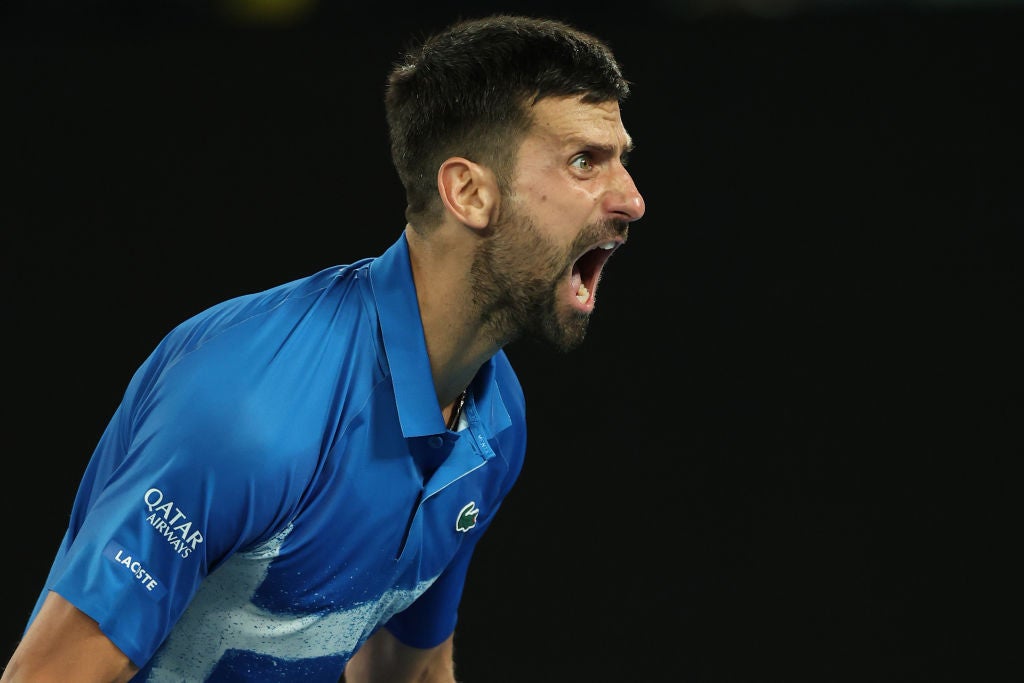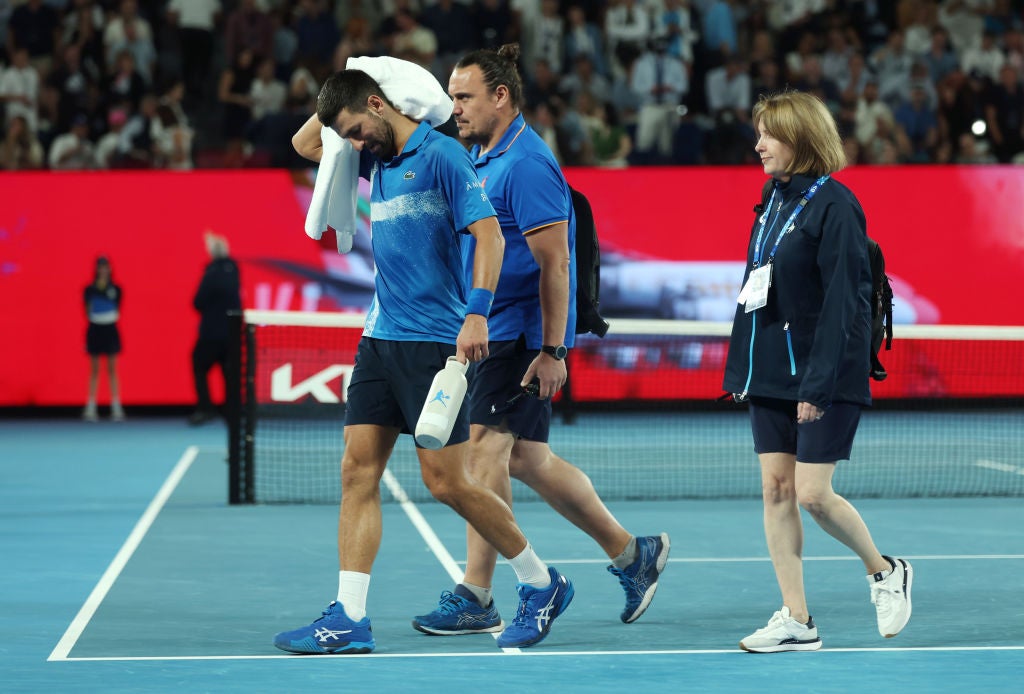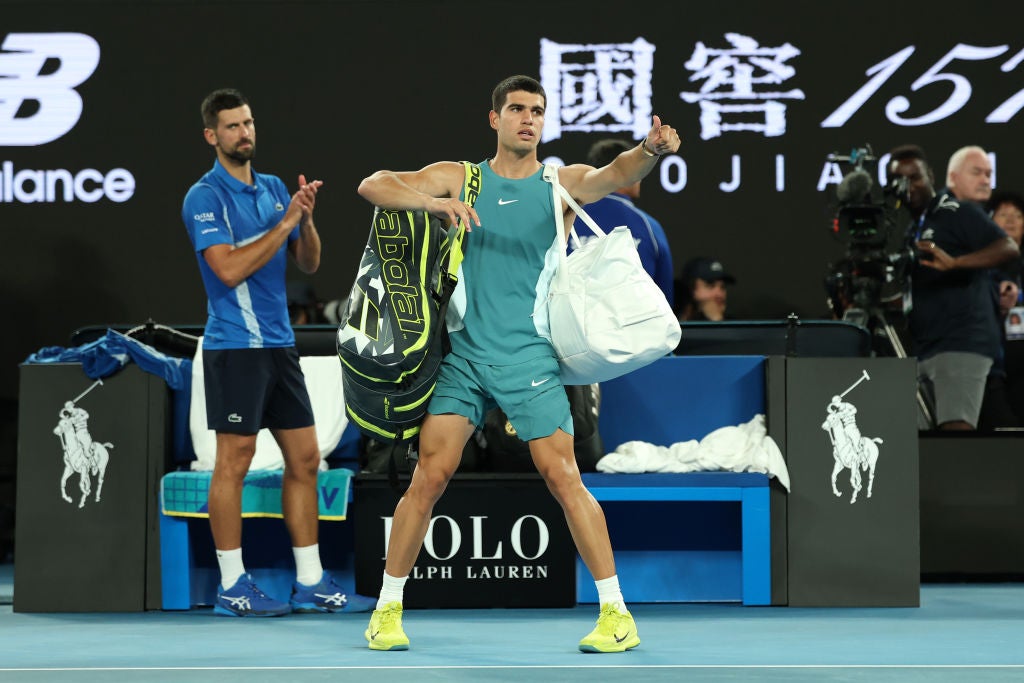
When Carlos Alcaraz saw his great rival Novak Djokovic limp off the court towards the end of the first set of their blockbuster Australian Open quarter-final, the 21-year-old admitted to feeling a sense of relief. Alcaraz’s experience of the Olympic final at Roland Garros, where Djokovic raised his level to win that elusive gold medal last summer in a hugely emotional defeat for the young Spaniard, ensured he needed no reminder of how fearsome an opponent the 37-year-old remains when fully fit.
But as Djokovic struggled to move from side to side, let alone return his groundstrokes on the run or hit through his opponent from the back of the court, Alcaraz’s shoulders relaxed. Djokovic, head down, exited the Rod Laver Arena for a medical timeout, returning after several minutes with heavy strapping around his upper left leg. A few moments later, Alcaraz wrapped up the first set; having beaten Djokovic in consecutive Wimbledon finals over best-of-five, it looked a long way back for the 10-time Australian Open champion.
But Alcaraz will not forget what happened next. Sensing a stricken opponent, Alcaraz started to reign in his attacking play, taking the safer approach to extend the rallies. Playing on one leg, Djokovic began to swing for the lines and shorten the points. Subdued in the first set, Djokovic became the aggressor, now with nothing to lose. He broke Alcaraz in the opening game of the second set; then pounced when Alcaraz served at 5-4 to break again and level the match. Gradually, as the painkillers Djokovic was given during the medical timeout began to kick in, he became a different player.

An epic, improbable comeback against Alcaraz to reach a 50th grand slam final reminded Djokovic of his 2023 run in Melbourne, when he battled through a hamstring injury to win a record-extending title. Without revealing his latest physical issue, he suggested he now faces a similar problem. Two years ago, Djokovic increased his forehand speed to devastating effect; against Alcaraz, he found an aggressive, attacking approach suited him once more and gave him energy to fight from behind. Djokovic admitted he may have quit had he lost the second set. Instead, he battled through to set up a semi-final clash with Alexander Zverev.
For Alcaraz, the regret was allowing Djokovic to wriggle off the hook. The smiling, charismatic Spaniard had to be ruthless, but Djokovic’s injury became a distraction for the 21-year-old, who learnt what he hopes will be a valuable lesson. “Honestly, I felt like I was controlling the match, and I let him get into the match again,” Alcaraz said. “I’m going to say that was the biggest mistake that I made today. On the second set, I had to play a little bit better just to push him even more to the limit. He had issues just moving a little bit in the second set. I had to push him a little bit more just to the limit, and I didn’t.”

Djokovic noticed Alcaraz losing his focus. “I felt that he was looking at me more than he was looking at himself,” Djokovic said. “I saw it. I tried to use that to my advantage, to take the initiative of the rallies and his hesitation. He was trying to play at some point quite a few drop-shots and make me run. I’ve been in those situations, as well, where the opponent’s struggling with injury but kept going. The opponent is going for everything, and then he’s staying in the match. Then all of a sudden, as the match progresses, the opponent feels better. You’re starting to panic a bit with your game. I understand the feeling.”
The match became a psychological one. “When you are seeing someone that is struggling physically, it’s [more about] you not playing the same level,” Alcaraz reflected. “It seems like, OK, it’s going to be easier. At the same time in your mind you’re thinking, like, OK, I have to not make mistakes. You’re probably not hitting the ball the same way that you’re hitting before. He did great, started to play more aggressively, which made him stay up in the set. It was really difficult to overcome that.”

Alcaraz faced prime Djokovic in the third and fourth sets. Despite the injury, he was tormenting Alcaraz on the returns, remaining rock solid on the baseline, serving with accuracy while growing into the match physically and being able to return powerfully on the run on both wings. Djokovic also won the biggest points and Alcaraz felt he was as good on the Rod Laver Arena as he was in the Olympic final. If so, it is a performance that proves that Djokovic is still capable of winning a 25th grand slam title this month. “When Novak is playing at this level, it’s really difficult to find the way,” Alcaraz said.
But Djokovic’s challenge doesn’t get any easier from here. This was only a quarter-final but he said battling Alcaraz in almost four hours, in a match that finished at almost 1am local time, felt like a grand slam final. He will now need to raise his energy again to face the in-form Zverev on Friday but Djokovic does not know what condition his leg will be in once the painkillers wear off. “I’m concerned, I am,” Djokovic said. “But if I manage somehow to be physically good enough, I think mentally, emotionally, I’m as motivated as can be.” Unfortunately for Alcaraz, he realised that far too late.







